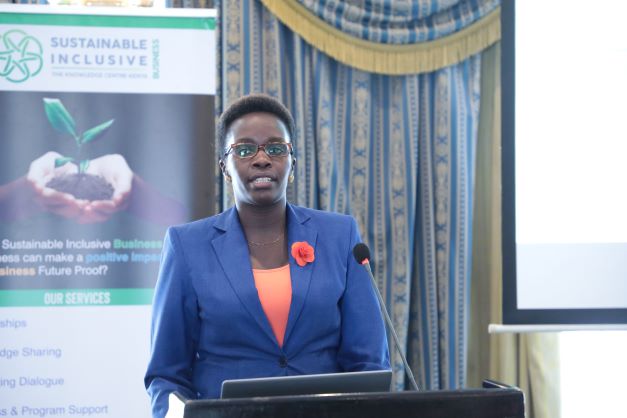KEPSA DEPUTY CEO MARTHA CHERUTO’S REMARKS DURING THE OFFICIAL LAUNCH OF THE SIB MAGAZINE ON 8TH JUNE 2022 AT THE SAROVA STANELY HOTEL IN NAIROBI
Dr. Ayub Macharia, Director of Environmental Education and Awareness
Sustainable Inclusive Business team,
Partners, guests, and members of the media,
Hamjambo.
It is with great pleasure that I join you today, as we mark yet another milestone in the circular economy space in Kenya. Today’s launch of the first edition of the Sustainable Inclusive Business Magazine dubbed, “Transitioning to a Circular Economy in Kenya” is not just any other event, but a showcase of our continued efforts as a country, to document and showcase efforts in transitioning from the linear economy model.
Your contribution and presence here today, further cements your commitment, as a business, to increasingly use innovative solutions for dealing with the waste management challenge that faces us. Your case studies are a true testimony that we’re creating the right business models, and that we’re in the right direction in swiftly transitioning to a more sustainable economy.
From all your experiences, I am sure that you can attest that building the environmental and people aspects of any business does not come easily. The major preoccupation is almost always on the financial return. Yet, every so often, events that shock us back to reality visit us.
We learn that whereas financial return is significant, it cannot be sustained for long if we ignore our communities, the quality of our environment, and the ecosystems on land and water. That is why I wish to commend all your efforts, both individually and combined.
The last two and a half years have been most challenging for everyone but particularly for businesses. Even as we continue recovering, the impacts of the Covid-19 are still largely being felt. We saw revenues decline significantly and over 1.7 million jobs were lost. KEPSA has worked closely with the government and particularly with partners to cushion Kenyans and businesses, especially SMEs, against the adverse effects of the global pandemic. We developed priority interventions to be pursued under the KEPSA Economic Management Framework for Covid-19 Response to ensure business continuity. Adopting economic stimulus measures by the government and relaxation of the restrictions greatly cushioned businesses from total shutdown and safeguarded millions of jobs.
We also identified five pillars to accelerate the economy, aimed at helping us emerge economically stronger together. These pillars include public-private dialogue, governance, business hub, the social pillar, and sustainability; through which Sustainable Inclusive Business, the Knowledge Center under KEPSA continues to create impact.
Our Sustainability Pillar has guided us in championing the adoption of green and blue economy principles. SIB-K contributes to the transition to a circular economy, Kenya’s vision 2030, and the Sustainable Development Goals. Through initiatives such as Creating Opportunities and Alleviating Poverty Through Sustainable Trade (COAST Project), we are not only creating awareness of waste management but are also increasing the capacity of participants to develop business cases through mentorship sessions.
Sustainable Inclusive Business is also harnessing local entrepreneurs’ skills; enhancing their access to financing and creating sustainable infrastructure to help them start micro and small businesses. These efforts are aimed at creating a sustainable income even in the informal sectors for inclusive growth. Through SIB-K, KEPSA will continue to contribute to advancing SDGs that empower people, protect the planet, foster prosperity for all, and develop sustainable quality infrastructure. This will in turn promote trade and investments in a circular economy.
Furthermore, SIB is leading the implementation of the Kenya Plastics Pact, an ambitious, collaborative initiative that brings together stakeholders across the plastics value chain to create a sustainable circular economy for plastics. Launched in October 2021, the Pact already has a growing membership uniting brands, plastic producers, recyclers, government agencies, civil society organizations, and waste pickers representatives, behind commonly agreed targets in accelerating the circular economy for plastics in Kenya. This is a crucial time for businesses to join the Pact since we are already implementing technical Working Groups which offer a platform for detailed discussions and collaborative actions – developing clear guidance and outputs. These are truly cross-sectoral and involve stakeholders working together on common challenges across the plastics value chain.To the SIB team, bravo for the job well done.
As I conclude, if we have learned anything from the Covid-19 pandemic, we must take care of the planet and its various building blocks. We must tend to those delicate ecosystems that we often ignore. We must build cities that prioritize positive impact on the nature around them, and, above all, we must make people and communities part and parcel of our businesses and governance systems.
Let us journey together and collaborate broadly and intimately, as we continue advocating for sustainable and inclusive models that will ensure future-proof businesses and economies.
It is with these remarks, that I now pronounce the Sustainable Inclusive Business Magazine First Edition, officially launched.
Thank you, and God bless you.


